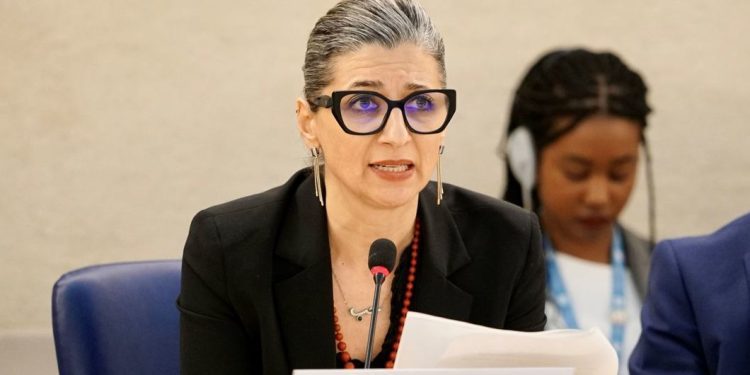There should be a ‘full cease-fire and no resumption of hostilities,’ followed by discussions on how to end Israel’s military occupation, says Francesca Albanese
GENEVA
It has been more than 10 days since the UN Security Council passed a resolution demanding an immediate cease-fire in Gaza for the Islamic holy month of Ramadan, but no visible steps have been taken for its implementation.
Francesca Albanese, UN special rapporteur on the occupied Palestinian territories, told Anadolu that Security Council resolutions are “absolutely binding … so it is to be acted upon.”
“It seems to me that we are not there yet as a cease-fire has not been declared,” she said.
The March 25 resolution only passed because the US, which had blocked three previous such moves, decided to abstain and not exercise its veto.
However, Albanese asserted that this resolution is “the minimum acceptable.”
There are “so many things that need to happen,” including opening all the crossings to let aid flow into Gaza, said Albanese.
As an occupying power Israel has the responsibility to ensure access for this aid, but it is not fulfilling those obligations, she added.
“Israel also has the responsibility to provide that aid. So, the fact that this was not even evoked, seems to me to create a precedent that an occupying power doesn’t have those responsibilities toward the occupied population,” said the UN official.
She called for a cease-fire to be enforced “as soon as possible,” while voicing concerns over Israel’s plan for a ground attack on Rafah in southern Gaza.
“An attack on Rafah would be a disaster over a disaster, a catastrophe within the catastrophe,” Albanese warned.
There are over 1.5 million “desperate” people in Rafah who are surviving “without food, proper shelter, and are in great distress,” she said.
“So how will a military operation spare these lives?”
Another “feared outcome” of such an attack would be that people might push toward the Rafah border to get into Egypt’s Sinai, which would begin another “instance of mass forced displacement of Palestinians out of the little of Palestine that remains,” she added.
‘Nothing of what they are going through is bearable’
Israel, which is facing a genocide case at the International Court of Justice, has now killed more than 33,000 Palestinians in Gaza, a majority of them women and children, and injured almost 76,000.
It has laid waste to most of the enclave, displacing millions and leaving them facing starvation due to a crippling blockade on aid and essentials.
Even if a cease-fire is implemented, Albanese warned that reversing the massive humanitarian crisis remains an almost impossible challenge, given that the truce would just be for Ramadan, which ends next week.
Palestinians in Gaza “are being reduced to bare life right now,” she said.
“There is just survival. Nothing of what they are going through is bearable,” said the UN rapporteur.
“They’re still alive, but this is not real life. It’s bare life. It is life deprived of any civilian content.”
That is why there should be a “full cease-fire and no resumption of hostilities,” she said, adding that this should be followed by discussions on how to end Israel’s military occupation.
She said Palestinians are subjected to “multilayered” violence, stressing that unless the root causes are addressed “we will continue to see violence in cycles of violence.”
Albanese recently released a report on Israel’s actions against Palestinians, which said there are “reasonable grounds” to believe it is committing genocide in Gaza.
She said that Israel’s actions can only be interpreted as constituting “prima facie evidence of an intention to systematically destroy the Palestinians as a group.”
In a statement about her report, the UN Human Rights Office said the special rapporteur’s analysis “found that the threshold indicating Israel’s commission of genocide had been met.”






